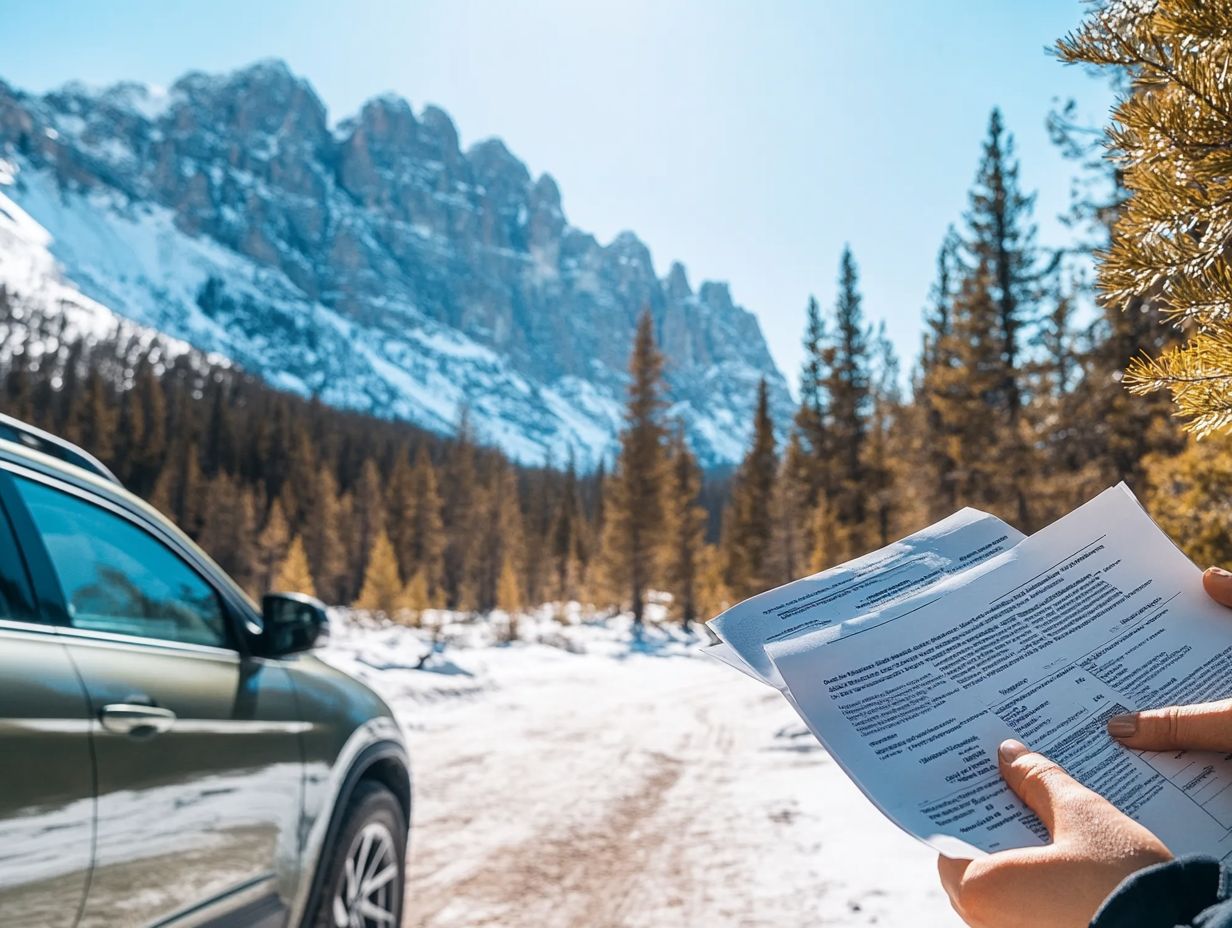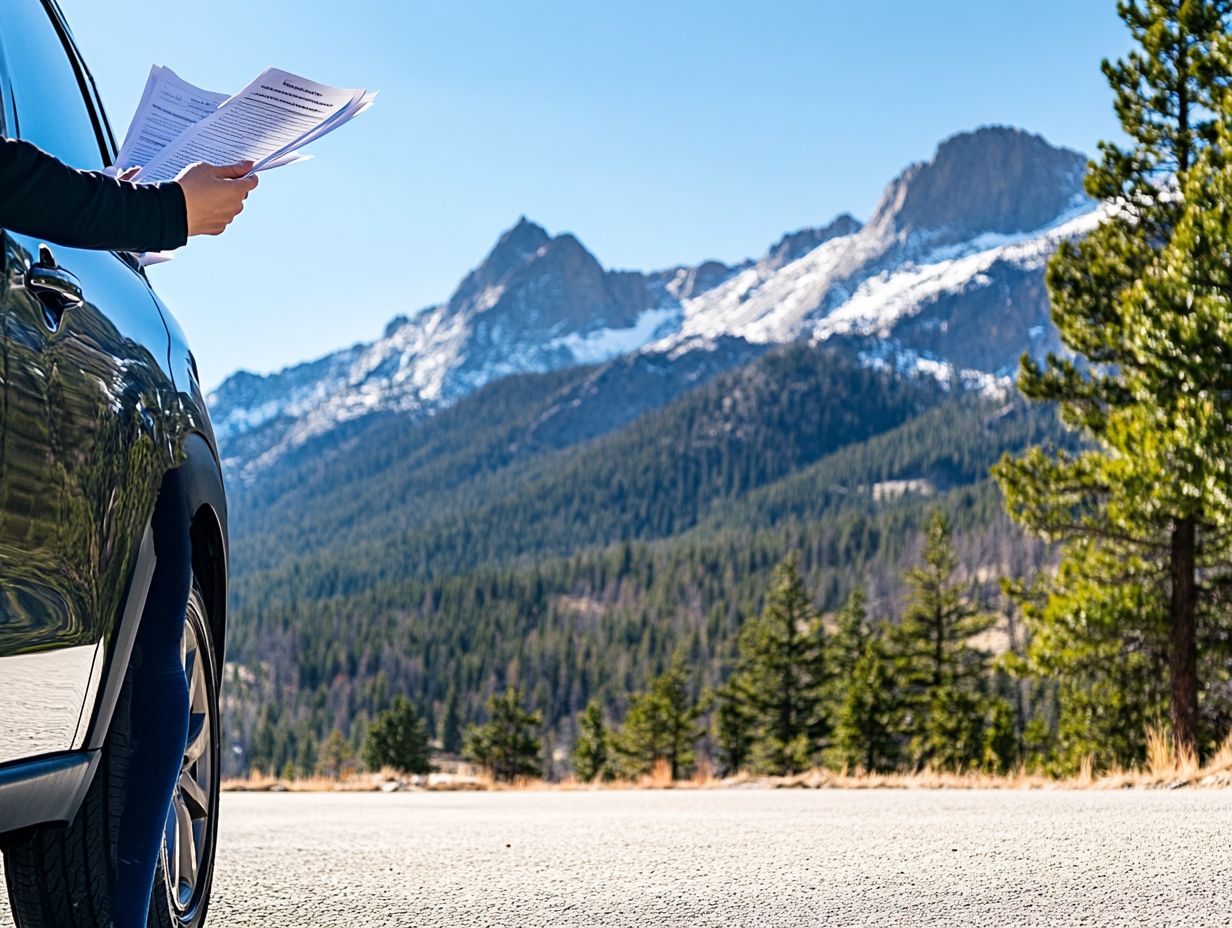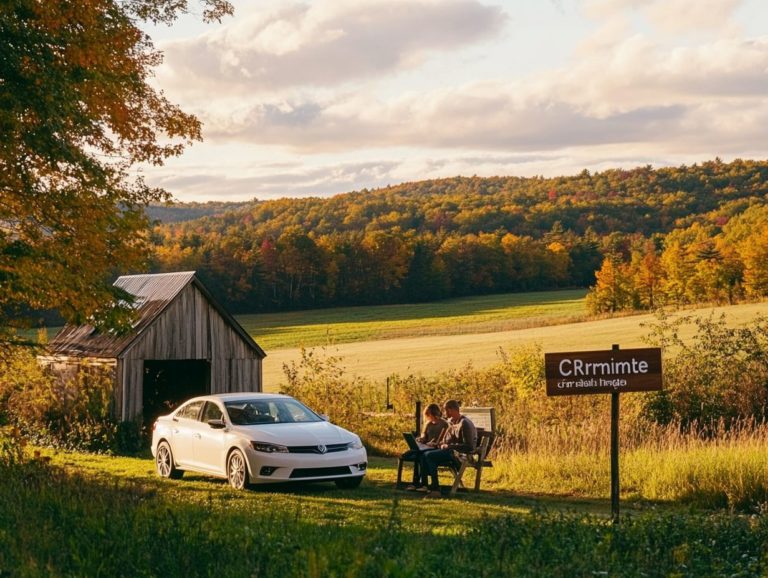Auto Insurance Coverage for Colorado Residents
Navigating auto insurance in Colorado may seem overwhelming, but grasping your options and requirements is crucial for making the best decision tailored to your needs.
This article distills the essential components of auto insurance, outlining the minimum legal requirements alongside various additional coverage options. Let s explore the key factors that could save you money on your premium!
Moreover, you ll uncover practical strategies to save money while ensuring you don t compromise on protection.
Contents
- Key Takeaways:
- Overview of Auto Insurance Coverage in Colorado
- Factors Affecting Auto Insurance Rates
- Types of Auto Insurance Coverage
- How to Choose the Right Auto Insurance Coverage
- Smart Strategies to Slash Your Auto Insurance Costs!
- Frequently Asked Questions
- What are the minimum requirements for auto insurance coverage for Colorado residents?
- What additional optional coverage should Colorado residents consider for their auto insurance?
- Is there a penalty for driving without auto insurance in Colorado?
- Are there any discounts available for auto insurance coverage for Colorado residents?
- Does my auto insurance coverage extend to rental cars in Colorado?
- What should I do if I get into an accident in Colorado?
Key Takeaways:

- Protect yourself on the road with these must-know insurance tips: Colorado residents are required to have a minimum amount of liability coverage for their auto insurance, but additional options can provide more comprehensive protection.
- Understand that factors such as your driving record, vehicle type, and location can impact auto insurance rates. It’s important to compare quotes and understand how premiums are determined.
- Familiarize yourself with the types of auto insurance coverage, including liability, collision, comprehensive, and uninsured/underinsured motorist. Choosing the right coverage for your needs and budget is crucial.
Overview of Auto Insurance Coverage in Colorado
Auto insurance coverage in Colorado offers essential financial protection against the many risks that come with driving. In the Centennial State, specific insurance laws outline the minimum coverage requirements you must meet to legally navigate the roads.
Grasping these regulations is vital not only for compliance while also ensuring you are adequately protected against accidents or damages. Many insurance providers offer a variety of policies, including liability coverage, which plays a critical role in shielding you and others involved in unfortunate incidents.
Minimum Requirements and Additional Options
In Colorado, the minimum insurance requirements mandate drivers to carry liability coverage that protects against bodily injury and property damage for others on the road.
Specifically, you need to maintain at least $25,000 for bodily injury per person, $50,000 per accident, and $15,000 for property damage. While these figures outline the basic requirements, you might consider additional coverage options to bolster your protection.
For instance, opting for uninsured motorist coverage is highly advisable; it offers financial support should you find yourself in an accident with an uninsured driver. Ignoring these insurance mandates can lead to severe repercussions, including fines, community service, or even the suspension of your driver s license.
Ultimately, adhering to these requirements shields your finances and provides peace of mind for everyone on the road, contributing to a safer driving environment for all.
Factors Affecting Auto Insurance Rates
Auto insurance rates in Colorado can fluctuate considerably, influenced by a range of factors that relate directly to your driving history and associated risk behaviors. Insurance providers meticulously evaluate various aspects, including your driving record, which encompasses any violations or accidents, to ascertain the premiums you ll be required to pay.
If you are classified as a high-risk driver meaning you have had multiple accidents or violations you may encounter higher rates due to the elevated probability of future claims.
By grasping these intricacies, you can navigate the landscape more effectively and uncover affordable insurance options tailored to your needs.
What Determines Your Premium?
The premium for your auto insurance policy hinges on various factors, including your driving history and the coverage options you select.
A pristine driving record plays a pivotal role in this calculation, signaling to insurers that you are less likely to file claims, which reduces their risk and may consequently lower your premiums.
The type of coverage you choose be it minimum liability, comprehensive, or collision can significantly impact your costs; generally, the more extensive the coverage, the higher the premium.
You have the opportunity to leverage various insurance discounts, such as safe driver discounts or bundling multiple policies, which can further alleviate your expenses. Understanding how these elements interact aids you in selecting the right insurance and empowers you to plan your finances more effectively for the future.
To ensure you have the best coverage at the best price, take the time to review your current insurance policy or start comparing quotes today!
Types of Auto Insurance Coverage

In Colorado, you have a variety of auto insurance coverage options at your fingertips, each tailored to meet distinct needs and offer different levels of protection.
Liability Coverage
Liability coverage is an essential aspect of auto insurance in Colorado. It shields you from financial responsibility for bodily injury and property damage caused to others in an accident where you are deemed at fault.
This coverage safeguards your finances. It also meets Colorado’s minimum insurance requirements, which stipulate a minimum liability limit of $25,000 per person for bodily injury and $15,000 for property damage.
Without adequate limits, you could face major financial issues, potentially leading to serious debt if you’re held accountable for extensive damages or medical expenses. These limits are designed to ensure that accident victims receive sufficient compensation, promoting security for everyone on the road.
By grasping the intricacies of liability coverage, you empower yourself to make informed decisions that prioritize both safety and financial well-being.
Collision Coverage
Collision coverage is optional yet highly advantageous. It safeguards your vehicle against damage from collisions with other vehicles or objects.
Think of it as your financial safety net, ensuring you don t face the daunting burden of repair costs after an accident. This insurance helps pay for repair or replacement expenses when your car is involved in a collision, regardless of fault.
Imagine someone unexpectedly sideswiping your parked car or you accidentally clipping a guardrail. In these scenarios, collision coverage can help cover those often substantial repair bills, especially when dealing with other drivers who may be uninsured or underinsured.
It works harmoniously with liability insurance and comprehensive coverage, creating a robust protection plan that shields you from significant financial strain.
Comprehensive Coverage
Comprehensive coverage provides essential protection against a variety of non-collision incidents, such as theft, vandalism, and damage from natural disasters.
This insurance is a smart choice that protects you from unexpected events, ensuring you have financial security in situations often beyond your control.
Consider the impact of a severe hailstorm that damages your car’s roof and windows. With comprehensive coverage, repair costs are covered, sparing you from significant out-of-pocket expenses.
In the unfortunate event of theft, this coverage minimizes your financial loss. Including comprehensive coverage in your overall insurance strategy is vital for anyone seeking to be fully protected against potential risks, ultimately enhancing your sense of security on the road.
Uninsured/Underinsured Motorist Coverage
Uninsured and underinsured motorist coverage acts as a crucial safety net for you, delivering financial protection in the event of an accident caused by someone without sufficient insurance.
In Colorado, this coverage is especially important, as many drivers may lack enough insurance to cover damages from an accident. When you collide with an uninsured or underinsured driver, this coverage handles medical expenses, lost wages, and property damage that would otherwise come straight out of your pocket.
It effectively bridges the financial gap when the at-fault party lacks resources to compensate you for your injuries or damages. This coverage plays a vital role in ensuring you can recover from accidents without facing undue financial strain, allowing you to enjoy greater peace of mind while navigating the roads.
How to Choose the Right Auto Insurance Coverage

Selecting the ideal auto insurance coverage requires a thorough assessment of your individual needs and budget. Evaluate your circumstances carefully to identify the most suitable options.
Evaluating Your Needs and Budget
Evaluating your insurance needs alongside your personal budget is crucial for making informed decisions about your auto insurance coverage.
Begin this assessment by carefully considering your driving habits. If you frequently commute long distances, you may need more full coverage compared to someone who drives occasionally.
The age and condition of your vehicle also play a significant role. Older cars might not warrant an extensive policy.
Your personal financial situation will further dictate how much you can comfortably allocate to premiums. Establish a budget that feels right for you while ensuring adequate coverage.
Striking the right balance is essential. While lower premiums might seem appealing, having enough protection against potential liabilities will give you peace of mind on the road.
Smart Strategies to Slash Your Auto Insurance Costs!
Start saving money on your auto insurance today with some simple strategies, such as leveraging available discounts and exploring bundling options offered by insurance providers.
Discounts and Bundling Options
Many insurance providers present enticing discounts and bundling options that can lower your overall premiums, leading to noteworthy financial savings.
These discounts often include incentives for safe drivers with clean records, multi-policy discounts for merging various types of coverage, like auto and home, and loyalty rewards for long-term customers.
Exploring the benefits of bundling your home and auto insurance simplifies management and opens doors to even greater savings.
To navigate these options effectively, compare tailored quotes from different providers. This thorough approach empowers you to make the best decision.
Frequently Asked Questions
What are the minimum requirements for auto insurance coverage for Colorado residents?

In Colorado, drivers are required to have liability insurance with minimum coverage of $25,000 per person for bodily injury, $50,000 per accident for bodily injury, and $15,000 per accident for property damage.
What additional optional coverage should Colorado residents consider for their auto insurance?
Colorado residents may want to add uninsured/underinsured motorist coverage, protecting against accidents with uninsured or underinsured drivers. They may also consider comprehensive and collision coverage to protect their own vehicle.
Is there a penalty for driving without auto insurance in Colorado?
Yes, driving without auto insurance in Colorado is illegal and can result in a fine of up to $500, suspension of your driver’s license, and even jail time for repeated offenses.
Are there any discounts available for auto insurance coverage for Colorado residents?
Yes, some insurance companies offer discounts for safe driving records, completing a defensive driving course, or bundling multiple policies together. Always ask your insurance provider about potential discounts.
Does my auto insurance coverage extend to rental cars in Colorado?
It depends on your specific policy, but most insurance companies offer coverage for rental cars. Check with your insurance provider before renting a car to ensure you have the proper coverage.
What should I do if I get into an accident in Colorado?
If you find yourself in an accident in Colorado, act quickly: exchange insurance information with the other driver. Take photos of the scene and any damage.
File a claim with your insurance company right away. This means notifying them about the accident. Report the accident to the police if there are injuries or serious property damage.




